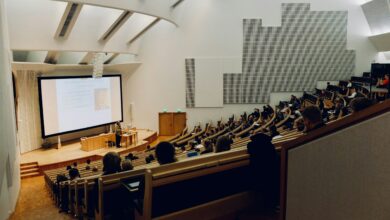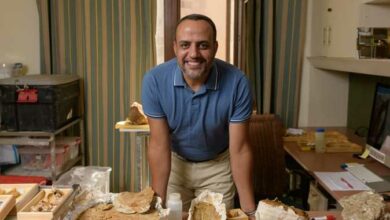On 1 June, the transitional government adopted its first post-uprising budget, characterized by a slight increase in funds allocated to science, research and higher education.
For the financial year 2011-2012, the spending on research is to increase from the previous year's figure of 0.4 percent of GDP to almost 1 percent. The government, after disclosing its new budget, declared its ambition to create no less than 50,000 young researcher posts within universities and research centers.
So how do scientists envision the future of their discipline, which seems to be getting more attention from the new government as it navigates the bumpy path to democracy?
“There is a serious need for a democratic system in Egypt,” explains Adel Yehia, chairman of the National Authority for Remote Sensing and Space Sciences (NARSS). “It is an unavoidable tool for better scientific research, because a democratic system offers an open environment in which scientific matters can be discussed freely and where information can be disseminated to the wider public,” he says.
Hoda al-Mikaty is the deputy director of the Bibliotheca Alexandrina Planetarium Science Centre (PSC), an educational facility that aims to present science and technology to the public in a fun and engaging way. “Science is all about openness, about discussion, about telling the truth, and it is typically a field where nothing can be prohibited," says Mikaty, convinced that democracy is Egypt’s best chance for the future.
According to Mikaty, with life in the 21st century increasingly based on science, a good level of scientific literacy is necessary for those who wish to be responsible citizens, capable of making conscious decisions on the nation's future.
What worries scientists and professors the most is the current condition of Egypt's educational system. All disciplines, including science, have been affected by the generally poor standards of research and education. Among the consequences of this is Egypt's inability to compete in the fields of scientific and technological research at an international level.
And yet, there seems to be no consensus on how to tackle the failings in the country's educational system, which affects students from elementary school through to higher education.
Mikaty is adamant that reform should start at the earliest possible stage, in elementary school. “We have to enhance the dissemination and teaching of scientific subjects in elementary school, elaborate on nurturing talents, rewarding creativity and stopping the rote learning system that is the norm of our educational system,” she declares with gusto. According to Mikaty, university students who spent their entire academic careers memorizing textbooks cannot be expected to develop good working practices and educational skills in later life.
Hany al-Hosseiny, an assistant professor in the department of mathematics at Cairo University, feels that improving the general level of education in the country is a mammoth task. “Teachers in Egypt are not ready right now to transition towards a more 'humane' type of teaching, and it will take time to reform the educational system from top to bottom,” he says.
“Also, the educational content in textbooks has to be altered and improved, but this is a very political issue that cannot be accomplished without a strong, political and social will,” he continues.
While the scientific community is no doubt glad to be getting more attention from the government, the increase to 1 percent of GDP is mostly considered insufficient, even compared to other countries undergoing a trasitional period.
Hosseiny explains that Turkey allocates between 4.3 and 4.5 percent of its GDP to science and research, while Malaysia allocates about 6 percent. “Egypt is definitely lagging behind,” he declares.
Although Yehia considers the improvement in Egypt's science funding to be some kind of “progress”, he says it is small when compared to the 3 to 5 percent growth scientists are hoping for in the near future.
“Allocating most of the money for the creation of 50,000 research jobs for young graduates does not make sense,” explains Yehia, who is convinced that the government has chosen to spend most of the money on job creation to “make people happy, although all these new researchers emerge from this weak educational system and have little chance of lifting the standard of research nationally.”
Bahi al-Essawy, a geology professor, explains that there are two ways of spending government money allocated to research. In his view, the government's approach is the wrong one.
“You can either disseminate this money to all the national research institutes and universities all over the country, which is a very stupid idea because the money will be wasted," says Essawy, "or pick quality research institutes and inject money there to help excellent scientists pursue their research with an increased budget.” One good example of the latter, says Essawy, would be Mohamed Ghoneim’s internationally praised kidney research project in Mansoura.
Hosseiny is also critical of the government’s plan to create 50,000 new research jobs in the coming three years, citing the inability of most universities to hire those researchers already out there. “PhD students and researchers have been demonstrating in front of the Ministry of Higher Education and Scientific Research, and Minister Amr Salama has not been able to tell them whether new posts will be created next year,” Hosseiny explains.
One of the many reasons why the standard of scientific research has been so low is because the government has not provided the necessary research infrastructure. The grim image of research the mathematician draws is further darkened by the absence of equipment that researchers need for their studies. “Some of them buy chemical products and all the equipment they need with their own money, but some fields of research are very expensive and researchers wait for years to get the machines they need,” he says. As a consequence, all projects are progressing very slowly.
Mikaty is convinced that increasing the budget dedicated to science should not be the priority. Instead, she says, what is needed is a “strategic vision for science."
“There is no national consensus on which fields of science should be prioritized for the best interests of the country, and to me the real question is: Where should Egypt direct its scientific research?” she says.
According to Mikaty, such a national scientific vision could be based on agriculture, water management or renewable energy, and should be defined and discussed to ensure that the money allocated would not be wasted on research projects that are not relevant to the strategy.




